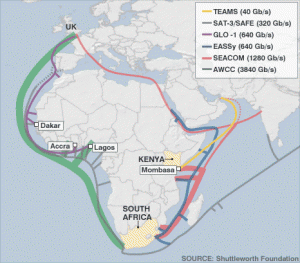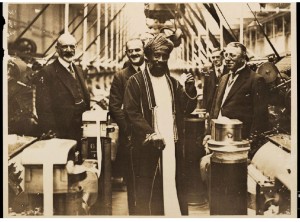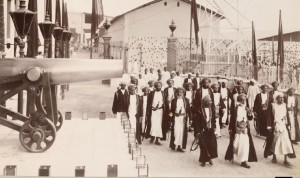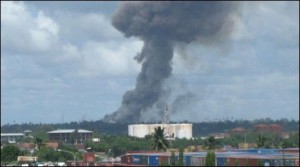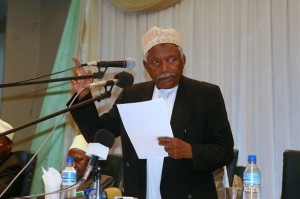On July 23 President Kikwete pressed a knob to inaugurate the Seacom International undersea fibre optic network in Dar. It is expected to revolutionise internet and telecommunication services in the country by improving efficiency and easing the current costs by over one third. He noted that the Eastern African coast had been the longest coastline in the world without optic fibre cable connections to the rest of the world. “Today, this is history,” he declared. However, he said the landing of the cable on Tanzanian shores could only be useful if there was a terrestrial link to pull it further inland to the masses of users. “We already have some existing network with Tanesco, Tanzania Railways Limited and the Songo Songo gas pipeline, but we have been working on a wider network to cover the whole country,” he said. The President added that the government had secured part of the financing and work had started on laying the National Optic Fibre Cable (OFC) network covering a distance of 10,674 kilometers – Guardian.
Category Archives: Miscellany
DRAMATIC BANK ROBBERY
Police in Dar es Salaam mounted a massive manhunt on July 31 after more than 10 armed robbers stormed the Temeke, Dar es Salaam branch of the NMB Bank, stealing over Shs 150 million, killing one person and leaving 14 others seriously injured. The gangsters came in three vehicles bearing government number plates, and, for the first time used hand grenades as well as small arms in the attack on the bank. According to The Citizen, they smashed the glass to the teller’s compartments and some of them gained access to the tellers’ cubicles, stashing money into their bags, while others kept a close eye on those who were lying on the floor. With bags bursting with cash, the thieves came out of the bank and got away in two of their vehicles.
Police Commissioner Manumba was concerned over the heavy weaponry used by the robbers. He said it was disappointing that despite efforts taken by the police force to check proliferation of small arms, there were still people in possession of such deadly weapons.
In 2006, armed robbers waylaid NMB vehicles at the Ubungo traffic lights and made away with millions of shillings, killing two people and injuring several others. 16 people were charged in connection with the robbery. Their case continues at the High Court.
In another incident, armed robbers attacked the NMB Mwanga branch in July 2007, making away with Shs 234 million. In this one, several people, including 11 Tanzanians and Kenyans were charged and their case continues in a Moshi court.
HISTORICAL PHOTOS ONLINE
The Northwestern University, Chicago has recently made a large collection of historical photographs available online at website http://repository.library.northwestern.edu/winterton/
The Humphrey Winterton Collection of East African Photographs: 1860 – 1960 includes over 7,000 photographs from numerous sources, depicting life in Africa from 1860 – 1960. They include photographs of Zanzibaris and other Africans as well as the travels of European explorers, traders, colonialists and soldiers.
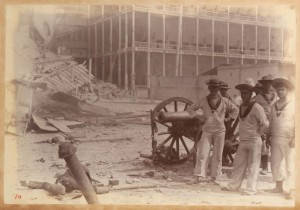
Group of British sailors posing in front of the Beit al-Ajaib - Bombardment of Zanzibar 1896 - Winterton Collection of East African Photographs: 58-5-2
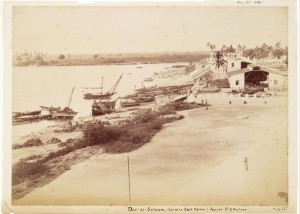
Dar-es-Salaam, (German East Africa) Kaiser St. & harbour. Aug. 23rd 1986 - Winterton Collection of East African Photographs: 12-1
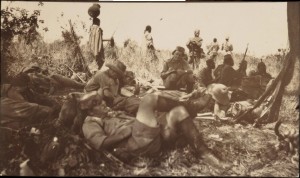
Machine gun in action, Bugaro, East Africa Campaign. Circa 1914-1918 - Winterton Collection of East African Photographs: 8-6-3
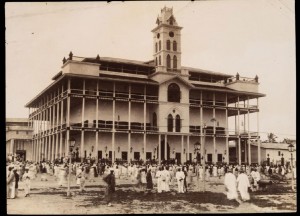
Sultan's Palace, Zanzibar with a crowd in the foreground circa 1893 - Winterton Collection of East African Photographs: 64-12
MISS UNIVERSE TANZANIA
The 2009 Miss Universe Tanzania, Illuminata James, waves to the audience after being declared the winner over 19 other girls (photo Issah Michuzi). Apart from the crown she took home Shs3 million, was offered a one-year French course at the Alliance Francaise, cosmetics worth Shs 500, 000 and a Samsung Omnia cellphone. Someone from the audience, who was not named, gave her $1000.
TANZANIA RAILWAYS LIMITED
The CCM MP for Nzega described, in the investigative newspaper ‘This Day’ how he saw the controversial goings-on within Tanzania Railways Limited (TRL), which has a long-term management contract with government as bearing all the hallmarks of something similar to the Richmond electricity corruption scandal. He alleged that new reports of a contract for the leasing of locomotive engines and coaches from India were ‘scandalous.’
Under this agreement TRL would eventually be forced to pay huge capacity charges for 25 locomotive engines and 23 coaches. In addition the financially-troubled TRL had already had to pay a substantial sum for the shipment of the engines from India to Dar es Salaam. He said that the contract should be terminated forthwith. TRL Managing Director Hundi Lal Chaudhary said these allegations were not true. He admitted that TRL was in a critical financial situation, but insisted that both the shareholders (RITES and the Tanzanian Government) are supposed to find a lasting joint solution. RITES Limited owns 51% of the shares while the Government has 49%.
The government said that a special task force appointed to review the TRL privatisation contract with a view to amending some of the key provisions, had already completed its task. Railway sources reported to ‘This Day’ that the TRL expatriate management had grounded seven Canadian and UK-made locomotives to pave the way for their replacement by leased engines from India. According to the sources, TRL planned to sell off the once-dependable locomotives of the 88-class, traditionally used by the railways since when it was a state-owned enterprise, as scrap in preference for the leased engines from India.
Some TRL workers are said to have accused the RITES management of sabotage in its bid to scrap the 88-class engines in favour of the costly and less reliable Indian engines. These reports were later confirmed by Managing Director Chaudhary.
There was an ongoing debate as to which type of engine was the more powerful. Some said that the Canadian and UK-type engines were still the best and most widely-used all over the world. They were still working and in good condition, compared to Indian engines which were said to “frequently malfunction” others said.
It has also been claimed that unilateral decisions by the TRL management to dispose of the old locomotives would amount to a breach of the lease contract between RITES and the Tanzanian Government. Some railway workers were said to have accused the management of planning to create a market for Indian-made locomotives and spare parts in Tanzania by hook or by crook. It has been alleged that the intention is that if the Government eventually decides to terminate the RITES contract, TRL will be left with leased Indian locomotives that will still had to be paid for, probably at inflated costs.
Managing Director Chaudhary confirmed the reports of the grounding of seven running locomotives and plans for their replacement with Indian-made engines. “We have decided to use the Indian-made locomotive engines because they are more powerful than the Canadian and UK types,’’ he said.
RITES Limited of India and the Tanzanian Government signed a 25-year concession agreement for the
2,700-kilometre state railway network in 2007. In parliament Zitto Kabwe MP said there had been few bidders for the railway corporation at the time as a result of which government was forced to hand 51% to the Indian firm RITES.
TRL said that it had started repairing its locomotives in a bid to improve services. Speaking to reporters during the offloading of two rehabilitated engines at the Dar es Salaam port, TRL executive director Mukesh Rathore said that the locomotives were overhauled to increase their pulling capacities from 20 wagons to 25 wagons each. The engines would be tested at the company’s major workshop in Morogoro before they started operating. He said that since 1973 when the engines were bought they had never been overhauled. He said the remaining engines would be repaired at the Morogoro workshop.
TRL said they had a total of 22 engines, though only seven were functioning properly. 26 passenger wagons had been repaired and the plan was to repair all the 82 wagons by mid 2010 – Guardian.
As this issue of TA went to press the East African reported that high level discussions were going on in India, Tanzania, Burundi and Rwanda on a possible restructuring of the railway to incorporate Rwanda and Burundi.
DAR EXPLODES
Dar es Salaam was hit by a series of massive explosions on April 29. A Guardian reporter wrote: ‘Thunderclaps…Quiet moment… More thunderclaps… Another quiet moment…Yet more thunderclaps… Yet another quiet moment… the random interplay ran on for hours.’
Deafening blasts from the military armory site in Mbagala, 14 kms from the city centre, tore through the city’s skies and left both people and buildings shaking. Some 20 people were killed and 200 injured and up to 7,000 houses were destroyed. Rockets hit sites as far away as 23 kms from the scene of the explosion.
On August 1 Defence and National Service Minister Hussein Mwinyi said that he was re-confirming some sensitive details of the report which had been prepared on the tragic bomb blasts before making it public.
MISCELLANY
A contingent of 875 Tanzanian soldiers headed for peacekeeping duties in Darfur received armoured personnel carriers, trucks and other equipment worth $6.2 million from the US armed forces.
The British High Commission, in conjunction with the Journalists’ Environmental Association of Tanzania (JET), is organising a media competition on climate change. Head of the Mission Diane Corner said that the competition would take place 20 days before the international conference on climate change in Copenhagen. The winner would attend the conference in order to cover it.
Members of CCM in Britain have been urged to promote Tanzania. The party secretary for finance and economy, Amos Makala, said this in London while opening an annual meeting of CCM members in Britain. He blamed Tanzanians in the diaspora who adopted “unpatriotic” attitudes towards the country by tarnishing its image. “I call upon you to work hard to counter these instigators who conduct negative campaigns for their personal gain,” Makala said – Mwananchi
A 17-year old British student in a school party in July was found at Dar airport to be infected with Swine flu. He flew via Kenya Airways with a stopover at Nairobi airport. He was in an advanced detachment of 350 students visiting Tanzania for tourism and training during the summer vacation. He was kept in a special ward at Muhimbili Hospital and his condition soon improved- Habari Leo.
The Tanzanian Ahmed Ghailani is to be prosecuted in a Federal Court in New York. The charges relate to the August 1998 bombing of the US embassies in Tanzania and Kenya that killed more than 200 people. According to the transcript of a closed-door hearing in March 2007, Ghailani admitted delivering explosives used to blow up the US embassy in Dar es Salaam but said that he did not know about the attack beforehand and apologised to the US government and the victims’ families. He is considered to be a “high value detainee” at Guantanamo Bay in Cuba by the CIA. Ghailani was seized in Pakistan in 2004.
A British national caused the Manyara magistrate’s court to be suspended for a while after she broke into tears when she saw a man she claimed to have raped her. The volunteer teacher had arrived in Babati from Britain in February. According to Nipashe on 1 April at 3.45 pm the alleged rapist, a project coordinator with “Farm Africa”, entered the room of the complainant without her consent and sexually assaulted her. Neighbours informed the school management and the matter was reported to police who arrested the accused. The case was adjourned and the accused was allowed out on bail.
The Observer reported that University Vice-Chancellor Prof Rwekaza Mukandala had ‘torn apart’ his lecturers when he addressed them in April. They had blamed declining academic standards at the university on ‘semesterization.’At the end of the session, in which the lecturers had called for a ‘revamping and overhauling’ of the university (to the applause of the students) the Vice-Chancellor called the lecturers ‘lazy and money-hungry’ as they moved from institution to institution, often on the same day, in order to acquire greater income. He had asked them to send him revised curricula of the programmes they were teaching but had received responses from only six out of 1,200 faculties. Lecturers were simply not according their duties the seriousness they deserved, he said.
CONDOMS CONDEMNED
The use of condoms against Tanzania’s AIDS plague was condemned by religious leaders and others in a series of widely publicised events in March this year.
On the BBC TV’s Newsnight programme a lady representing the Catholic Church became so excited in her defence of the ‘Catholic way’ that the presenter, Jeremy Paxman, had to ask her to calm down. Such outbusts, he said, were not the way debates were conducted on his programme.
Jonathan Clayton writing in the Times recalled that, on a balmy late afternoon in September 1990, Pope John Paul II visited Mwanza and gave a speech that many believe set the tone for the AIDS crisis in Africa. Those inside the packed church and a huge crowd gathered outside hung on to every word. The Pope promised to give answers about the strange ‘slimming’ disease that had seemingly come from nowhere to destroy local and other communities. He was unequivocal. He said that condoms, then internationally accepted as the only real way to curtail the spread of the disease, were a sin in any circumstances. He lauded family values and praised fidelity and abstinence as the only true way to combat the disease. AIDS activists, including many Catholics were appalled. Clayton wrote: ‘For many, in that one afternoon, the Vatican destroyed more than a decade of patient campaigning and sentenced millions of Africans to death.’
During his recent visit to Germany Pope Benedict XVI reiterated Pope John Paul’s view with passion and thus raised further controversy.
Mwinyi provokes a storm
A few days earlier in Dar es Salaam, on Maulid Day at the Diamond Jubilee Hall, some in the audience were reported to have been incensed when former President Ali Hassan Mwinyi advised Muslim clerics to discuss the use of condoms to help reduce the impact of AIDS.
A Mr Ibrahim Said was so angry that he climbed on to the platform and slapped the face of the former President. The result was that he was arrested and subsequently sentenced to one-year in prison. The Magistrate said the accused was being convicted on his own plea of guilty and the penalty was the right one for the offence, which had attracted widespread public interest. Before pronouncing sentence, the Magistrate gave the accused the opportunity to ask for the court’s leniency but the man then loudly began praying and reciting verses of the Holy Koran. The magistrate intervened and instructed the accused to go on with his prayers silently. The accused complied and then thanked the magistrate for giving him the opportunity to pray to the Almighty God. He had earlier said he attacked the President because he was promoting the use of condoms.
A fatwa (edict) was then issued by the Islamic Association (Jumuiya) in Dar es Salaam which said that extra-marital sex had been forbidden by God and no human being had the authority to amend the Koran. The question of condom use could be discussed in the case of married couples or in case of life and death but not otherwise. “Let Mwinyi inform us when have people died from abstinence,” said the fatwa. It called upon Mwinyi to retract his statement and ask for forgiveness from God. The congregation donated TShs 700,000 for Ibrahim Said. A businessman said that in the government’s eyes Said might be guilty but he would be rewarded in heaven. He agreed to donate TShs 10,000 every month to his family as long as Said was in prison.
At a mosque in Kinondoni Said was proclaimed as a ‘Muslim hero’. Hundreds of worshipers resolved that politicians should be banned from officiating at Muslim functions – Majira.
In Mwanza the head of a mosque was reported to have said that it was wrong for Mwinyi to mix religion with politics, adding that the meeting was an Islamic platform where promotion of condoms should not have been allowed – Mwananchi.
Clarification
In mid-April Muslim sheikhs and clerics met for four hours under the ‘Mwinyi Baraka Islamic Foundation’ to discuss the speech by the former president. They agreed that Mwinyi had not advocated condom use during the Maulid function but was merely describing the division among clerics on the issue of condoms. A spokesman of the Foundation, Hamis Mataka, told reporters that they had deliberated on two viewpoints elaborated by President Mwinyi. One was that in Islam extramarital sex is forbidden and sinful and should therefore be avoided at all costs. On the other hand those who failed to abstain should resort to safe sex so as to avoid spreading HIV/Aids. The meeting appointed a committee to go and see Mwinyi and apologise to him for the physical assault on him.
During the meeting the Chief of the Muslim Council (Bakwata), Sheikh Issa Simba, complained that there was a proliferation of sheikhs and clerics many of whom he said were ‘unqualified and half-baked’. He called for a procedure for approval of clerics. A committee of scholars and jurists was formed to coordinate such a procedure at national and international level – Nipashe and many other newspapers.
Finally in April Nipashe reported that the person who had slapped President Mwinyi had been transferred to Mirembe mental hospital.
Meanwhile the AIDS rate goes down
There has also been some good news on AIDS. The prevalence rate in Tanzania has dropped to 5.7% from a high of 7% in 2004, according to the most recent HIV/AIDS and Malaria Indicator Survey 2007/08. The study was carried out among people aged between 15 and 49 in all 26 regions on the mainland and in Zanzibar (see TA No 91). The government recently imported 100,000 female condoms (AIDS is more prevalent among women than amongst men) to be distributed countrywide as part of its efforts to empower women.
AIR TANZANIA & THE RAILWAYS
The crisis ridden Air Tanzania Corporation Ltd (ATCL) is once again in trouble, in spite of having been bailed out in January with $2 million by the government. Some ATCL workers have blamed the Director of Operations and other officials for the collapse of the airline. They referred to what they described as some dubious contracts, for example, the employment of four foreign pilots at a monthly salary of $10,000 who ended up with no work and the money was lost. An aircraft was said to have been leased at $370,000 a month but it did not fly for seven months – Mwananchi.
In August 2008 the airline’s planes were barred from flying for what were described as safety reasons. In December it was banned from flying by the International Air Transport Association (IATA) and the Tanzania Civil Aviation Authority because it was found not to be airworthy. This forced the airline to ground its planes, leaving the monopoly of the local routes to the successful privately-owned Precision Air and air charter companies. The main shortcomings were said to be poor inspection of aircraft and lack of pilots and aircraft engineers.
In December 2008 the government set up a seven-member task force under the chairmanship of Prof. Idris Msolo, the Vice Chancellor of the Ardhi University College, to make a critical analysis of the problems. Some of the regulations needed updating including the safety management manual, the risk management manual, the security manual and also five operational programmes including those dealing with pilot and aircrew training.
ATCL has 300 workers and three aircraft, a situation which Minister for Infrastructure Dr. Shukuru Kawambwa, described as unsatisfactory, saying that the number of workers may have to be reduced to enable the company to operate profitably.
Since June 2008 ATCL had lost about 60% of its market share on both domestic and regional routes, with routes between Dar es Salaam and Mwanza and Johannesburg plagued with cancellations – Sunday Observer.
Company Chairman Mustapha Nyanganyi blamed the government for not heeding several SOS messages sent out for financial help. He urged the government to inject something like $67 million to revive the ATCL, but other authorities were said to have estimated a need for between $300 million and $600 million.
The workers accused the managers of sloppy performance and called for their immediate removal. However, as many people pointed out, few public airlines in Africa are currently performing well. The government has entered into discussions with a Chinese investor for a possible partnership with ATCL.
President Kikwete has criticised Tanzania Railways Limited (TRL) for making crucial decisions on operations of the central line without involving the government. The railway was not the property of TRL, but of the government of Tanzania even though the RITES Company (from India) had taken over management responsibilities. He told TRL officials that they were just employees tasked to operate the railways. Kikwete explained that the government and RITES were in partnership and therefore, all decisions must be made jointly. The disputed plans included obtaining credits without involving the government, applications for more tax relief and the proposed removal of rail tracks between Tanzania and Kenya on the grounds that they were not profitable. The President said that that removal of any rail tracks would be tantamount to sabotage. He also wanted to see that all repairs of wagons were done in the TRL workshop in Morogoro and not elsewhere.
OBAMA BRINGS HOPE
According to the Citizen, Tanzania now has hope of accessing billions of shillings in contraceptive funds from the United States following the departure from office of former President George W. Bush. President Obama has reversed an executive order by Bush that dried up family planning funds to many poor countries, including Tanzania. Pressure from religious bodies concerned about abortion had resulted in the loss to Tanzania’s family planning budget of substantial aid sums. Crucial contraceptives, like family planning pills, condoms and other related health services were funded heavily by money donated by the US to organisations such as the Marie-Stopes International and USAID, which channelled the funds to national family planning associations.

